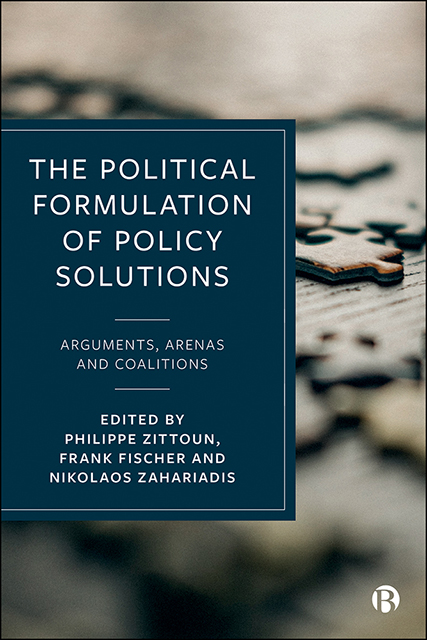Book contents
- Frontmatter
- Contents
- Notes on Contributors
- 1 Introduction – Policy Formulation: A Political Perspective
- 2 Upcycling a Trashed Policy Solution? Argumentative Couplings for Solution Definition and Deconstruction in German Pension Policy
- 3 Binding and Unbinding Problem– Solution Associations in US Agricultural Policy Making: The Introduction and Demise of Direct Payments to Farmers
- 4 The Role of Expert Reporting in Binding Together Policy Problem and Solution Definition Processes
- 5 Coalitions and Values in the Flow of Policy Solutions
- 6 The Marks of Ownership: The Promotion of Carbon Capture and Storage in France
- 7 Anticipating Public Approval in the Binding of Immigrant Integration Problems and Solutions
- 8 Discourse Coalitions and the Messiness of Policy Solutions: College Governance in Nevada
- 9 Policy Solution Ownership: Road-Space Re-Allocation as a New Approach to Urban Mobility
- Index
8 - Discourse Coalitions and the Messiness of Policy Solutions: College Governance in Nevada
Published online by Cambridge University Press: 21 April 2023
- Frontmatter
- Contents
- Notes on Contributors
- 1 Introduction – Policy Formulation: A Political Perspective
- 2 Upcycling a Trashed Policy Solution? Argumentative Couplings for Solution Definition and Deconstruction in German Pension Policy
- 3 Binding and Unbinding Problem– Solution Associations in US Agricultural Policy Making: The Introduction and Demise of Direct Payments to Farmers
- 4 The Role of Expert Reporting in Binding Together Policy Problem and Solution Definition Processes
- 5 Coalitions and Values in the Flow of Policy Solutions
- 6 The Marks of Ownership: The Promotion of Carbon Capture and Storage in France
- 7 Anticipating Public Approval in the Binding of Immigrant Integration Problems and Solutions
- 8 Discourse Coalitions and the Messiness of Policy Solutions: College Governance in Nevada
- 9 Policy Solution Ownership: Road-Space Re-Allocation as a New Approach to Urban Mobility
- Index
Summary
In the United States (US), the funding of public higher education and the formulation of higher education governing boards are functions of the state legislatures. For at least four decades, policy coalitions in Nevada introduced evidence in multiple state legislative sessions demonstrating that the state's public higher education governing board structure was suboptimal for student outcomes and workforce goals. But year after year, state legislators produced little to no policy change. Why? The answer largely lies in the role of policy discourse coalitions and their ability to shape policy ideas and solutions. In this chapter, I discuss how discourse coalitions circulated policy ideas that were bound with solutions and political influence to maintain a centralized higher education governing board structure that produced suboptimal student and workforce outcomes.
Social constructivist scholars argue that policy ideas and solutions are a complex activity that intersects with policy ideas, statements, and symbolic language use that may or may not be in the public discourse. Policy communities create an abbreviated list of solutions to survive the scrutiny of competing ideas. In the same way, discourse coalitions seek to influence, frame, create ownership, and negotiate policy solutions before and during deliberative processes. To accomplish this, coalitions often use discursive political instruments to position their ideas. One instrument is policy statements, which seek to unite actors, create ownership, and cement coalition members (Zittoun 2014; Durnova et al 2016). The discursive practices of coalitions and their actors can also serve to condense large amounts of factual information, mixed with normative assumptions and value orientations that assign meaning to them (Fischer 2003).
Through an analysis of Nevada policy actors’ discursive practices and state legislative bills between 2013 to 2014, I focus on how coalition actors created meaning for their proposals through policy statements and how they employed their discursive actions as a strategy to bind coalition identities around problems and solutions. Through their political power and control of information to policy makers, key coalitions actors dominated policy statements. Key to coalition actors’ strategy was their ability to create coalitions and bind specific policy statements to coalition actors; in doing so they created ownership for their respective proposals.
- Type
- Chapter
- Information
- The Political Formulation of Policy SolutionsArguments, Arenas, and Coalitions, pp. 151 - 172Publisher: Bristol University PressPrint publication year: 2021



